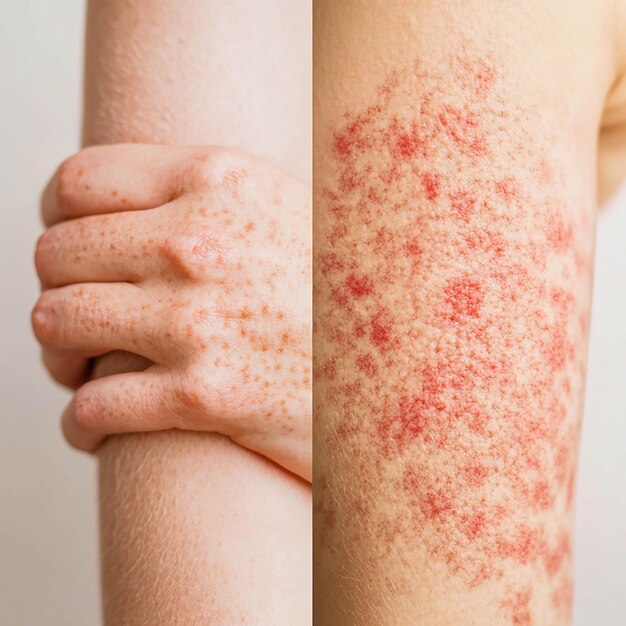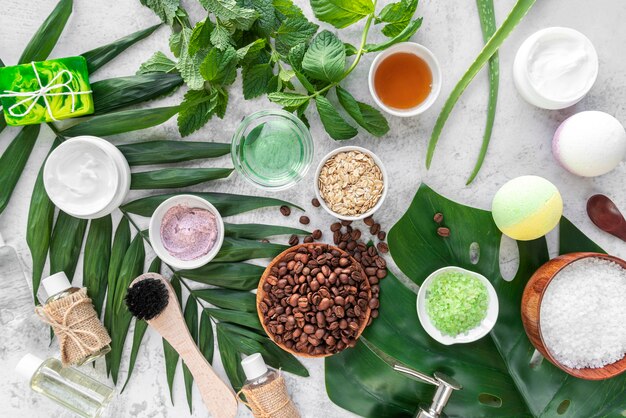आयुर्वेदिक डॉक्टर से प्रश्न पूछें और निःशुल्क या भुगतान मोड में अपनी चिंता की समस्या पर ऑनलाइन परामर्श प्राप्त करें। 2,000 से अधिक अनुभवी डॉक्टर हमारी साइट पर काम करते हैं और आपके प्रश्नों का इंतजार करते हैं और उपयोगकर्ताओं को उनकी स्वास्थ्य समस्याओं को हल करने में प्रतिदिन मदद करते हैं।
Ayurvedic Treatment for Lupus – Natural Approaches for Managing Lupus Symptoms

Introduction to Ayurvedic Treatment for Lupus
Lupus, a chronic autoimmune disease, affects various parts of the body, causing inflammation, pain, and tissue damage. Conventional treatments often involve immunosuppressants and anti-inflammatory medications, which can have significant side effects. Ayurvedic treatment for lupus offers a holistic and natural approach to managing symptoms by addressing the root causes, balancing the body's doshas, and enhancing overall health. By integrating Ayurvedic remedies, dietary modifications, and lifestyle changes, individuals with lupus can find relief from discomfort, reduce inflammation, and improve their quality of life.
स्वयं दवा न लें और प्रतीक्षा न करें। अभी डॉक्टर से चैट शुरू करें
Historical Roots & Ayurvedic Significance
Ayurveda, the ancient Indian system of medicine, emphasizes the balance of the three doshas—Vata, Pitta, and Kapha—to maintain health and prevent disease. Lupus, characterized by systemic inflammation and autoimmune responses, is primarily associated with an imbalance in Vata and Pitta doshas. According to Ayurvedic texts, such imbalances lead to the accumulation of ama (toxins) in the body, disrupting normal physiological functions and causing chronic conditions like lupus. Ayurvedic treatment focuses on detoxification, dosha balancing, and strengthening the immune system to restore harmony and promote healing.
Key Components & Therapeutic Benefits
1. Herbal Composition
Ayurvedic management of lupus involves a combination of herbs known for their anti-inflammatory, immunomodulatory, and detoxifying properties:
- Turmeric (Curcuma longa): Contains curcumin, a potent anti-inflammatory and antioxidant agent that helps reduce inflammation and oxidative stress.
- Ashwagandha (Withania somnifera): Enhances immunity, reduces stress, and has adaptogenic properties that help the body cope with chronic illness.
- Guduchi (Tinospora cordifolia): Boosts the immune system, detoxifies the body, and combats inflammation.
- Neem (Azadirachta indica): Possesses antimicrobial and anti-inflammatory properties that aid in managing autoimmune responses.
- Brahmi (Bacopa monnieri): Improves cognitive function, reduces stress, and supports nervous system health.
- Shatavari (Asparagus racemosus): Balances hormones, supports the immune system, and promotes overall vitality.
2. Detoxification & Dosha Balancing
The accumulation of ama and imbalanced doshas exacerbates lupus symptoms. Ayurvedic treatments aim to detoxify the body through Panchakarma (five cleansing therapies), herbal supplements, and dietary adjustments. Balancing Vatareduces joint pain and stiffness, while pacifying Pitta alleviates inflammation and skin manifestations associated with lupus. These detoxification processes help eliminate toxins, restore doshic equilibrium, and enhance the body's natural healing capabilities.
3. Applications in Inflammation & Immune Support
Ayurvedic remedies for lupus target both the inflammatory processes and the immune system:
- Reducing Inflammation: Herbs like Turmeric and Neem help in decreasing systemic inflammation, relieving pain, and preventing tissue damage.
- Immune Modulation: Ashwagandha and Guduchi regulate immune responses, preventing the body from attacking its own tissues.
- Skin Health: Turmeric and Neem are effective in managing lupus-related skin rashes and lesions, promoting skin healing and reducing irritation.
- Overall Wellness: Brahmi and Shatavari support mental health, reduce stress, and enhance overall vitality, which is crucial for individuals managing chronic conditions like lupus.
4. Integration with Ayurvedic Therapies
Integrating herbal treatments with Ayurvedic therapies enhances the effectiveness of managing lupus:
- Panchakarma: Detoxification procedures such as Virechana (therapeutic purgation) and Basti (medicated enemas) help eliminate toxins, balance doshas, and reduce inflammation.
- Abhyanga (Oil Massage): Promotes circulation, reduces joint stiffness, and soothes muscle pain.
- Swedana (Herbal Steam Therapy): Enhances detoxification, improves blood flow, and alleviates joint and muscle discomfort.
- Yoga & Meditation: Incorporates physical postures and mindfulness practices that reduce stress, improve flexibility, and enhance overall well-being.
How Ayurvedic Management Works: The Science Behind the Approach
Ayurvedic management of lupus operates on the principle of restoring balance within the body and eliminating toxins that contribute to autoimmune responses. The active compounds in herbs like Turmeric and Neem inhibit inflammatory pathways and modulate immune function, reducing the body's tendency to attack its own tissues. Panchakarma therapies facilitate the removal of ama, enhancing nutrient absorption and supporting organ function. Additionally, Ayurvedic practices promote mental and emotional balance, which is essential in managing the stress that can trigger or worsen lupus symptoms. This comprehensive approach not only addresses the symptoms but also targets the underlying causes of lupus, promoting sustained health and disease prevention.
Choosing the Right Ayurvedic Remedies & Guidance
When selecting Ayurvedic remedies for lupus, consider the following to ensure efficacy and safety:
- Consult Certified Ayurvedic Practitioners: Personalized treatment plans based on your Prakriti (constitution) and specific health needs ensure effective management and optimal results.
- Ensure High-Quality Herbs: Opt for formulations made from organic and authentic herbs to maximize therapeutic benefits and minimize exposure to contaminants.
- Source from Reputable Vendors: Purchase Ayurvedic supplements from trusted pharmacies or certified practitioners to guarantee product quality and proper formulation.
- Consider Comprehensive Approaches: Combine herbal treatments with dietary and lifestyle modifications for a holistic management plan that supports overall health and well-being.
Recommended Dosage & How to Use Ayurvedic Remedies for Lupus
The appropriate dosage of Ayurvedic remedies varies based on individual health conditions and constitutional types. Generally, the guidelines are as follows:
- Herbal Supplements:
- Turmeric: 1 teaspoon of turmeric powder daily or 500 mg capsules twice daily.
- Ashwagandha: 1-2 grams of powder or as recommended by a practitioner.
- Guduchi: 500 mg capsules taken twice daily or as directed.
- Neem: 500 mg capsules twice daily or Neem juice as recommended.
- Brahmi: 300-500 mg capsules taken twice daily.
- Shatavari: 1-2 teaspoons of powder mixed with warm water or as capsules.
- Panchakarma Therapies:
- Undergo Virechana and Basti as prescribed by an Ayurvedic practitioner, typically performed in cycles.
- Consumption: Herbal supplements can be taken with warm water or as directed by a practitioner. Always follow the recommended dosage and consult with a healthcare provider before starting any new treatment.
- Dietary & Lifestyle Adjustments: Incorporate a balanced diet that reduces Vata and Pitta, engage in regular physical activity, and practice stress-reducing techniques like yoga and meditation.
Potential Side Effects & Precautions
While Ayurvedic remedies are generally safe when used appropriately, consider the following precautions:
- Digestive Sensitivity: Some herbs may cause mild gastrointestinal discomfort. Start with lower doses to assess tolerance.
- Pregnancy & Nursing: Pregnant or breastfeeding women should consult an Ayurvedic practitioner before using herbal supplements.
- Allergic Reactions: Discontinue use if any allergic reactions or adverse symptoms occur and seek medical advice.
- Interactions with Medications: Inform your healthcare provider about any Ayurvedic treatments you are undergoing to avoid potential interactions with other medications.
- Quality Control: Ensure that herbs are sourced from reputable vendors to prevent contamination with heavy metals or adulterants.
Frequently Asked Questions (FAQ)
What is lupus and how does it affect the body?
Lupus is a chronic autoimmune disease where the immune system mistakenly attacks healthy tissues, leading to inflammation and damage in various parts of the body, including the joints, skin, kidneys, heart, and lungs. Symptoms can range from mild to severe and may include fatigue, joint pain, skin rashes, and fever.
How does Ayurveda approach the treatment of lupus?
Ayurveda treats lupus by balancing the doshas, particularly Vata and Pitta, eliminating toxins (ama), and using a combination of anti-inflammatory and immune-modulating herbs. Treatments include herbal supplements, Panchakarmatherapies, dietary modifications, and lifestyle changes to reduce inflammation and support overall health.
What are the common Ayurvedic herbs used for lupus?
Common Ayurvedic herbs for lupus include Turmeric (Curcuma longa), Ashwagandha (Withania somnifera), Guduchi (Tinospora cordifolia), Neem (Azadirachta indica), Brahmi (Bacopa monnieri), and Shatavari (Asparagus racemosus). These herbs possess anti-inflammatory, immunomodulatory, and detoxifying properties that help manage lupus symptoms.
Can dietary changes help manage lupus in Ayurveda?
Yes, Ayurveda emphasizes a balanced diet tailored to reduce Vata and Pitta. This includes avoiding processed and inflammatory foods, reducing dairy and gluten intake, and incorporating warm, easily digestible meals rich in fresh fruits, vegetables, whole grains, and lean proteins. Spices like turmeric, ginger, and black pepper are encouraged for their anti-inflammatory benefits.
What Ayurvedic therapies are recommended for lupus?
Recommended therapies include Panchakarma detoxification procedures like Virechana (therapeutic purgation) and Basti (medicated enemas), Abhyanga (oil massage), Swedana (herbal steam therapy), and Yoga practices. These therapies help eliminate toxins, reduce inflammation, balance doshas, and enhance overall well-being.
How long does it take to see results from Ayurvedic treatments for lupus?
The timeframe varies based on individual health conditions and adherence to the treatment plan. Some individuals may notice improvements in symptoms within a few weeks, while others might require several months for significant changes. Consistency and personalized care are key to effective management.
Are there any lifestyle modifications recommended in Ayurveda for lupus?
Yes, Ayurveda recommends regular physical activity, stress management techniques like yoga and meditation, adequate sleep, and maintaining a balanced lifestyle to support overall health and manage lupus effectively. Avoiding excessive physical strain and ensuring mental relaxation are also emphasized.
Conclusion & Expert Insights
Lupus is a complex autoimmune disease that requires comprehensive management to alleviate symptoms and prevent complications. Ayurvedic treatment offers a holistic and natural approach by addressing the root causes, balancing the doshas, and enhancing the body's innate healing capabilities. Through the use of potent herbs, detoxification therapies, and lifestyle modifications, Ayurveda provides effective relief from lupus symptoms and promotes long-term health and well-being. Consulting with qualified Ayurvedic practitioners ensures that treatments are tailored to individual needs, fostering sustained harmony and vitality within the body.
References & Further Reading
- Sharma, P.V. (1995). Ayurvedic Healing: A Comprehensive Guide. Motilal Banarsidass Publishers.
- Lad, V. (2002). Ayurveda: The Science of Self-Healing. Lotus Press.
- National Institute of Ayurveda:
- Chopra, D. (2006). Perfect Health: The Complete Mind/Body Guide. Harmony Books.
- Singh, P., & Aggarwal, B.B. (1995). "The Role of Ayurvedic Rasayanas in Aging." Ayu, 16(3), 207-210.
- National Ayurvedic Medical Association. (n.d.). Ayurvedic Treatments for Autoimmune Diseases.
- Aggarwal, B.B., & Harikumar, K.B. (2009). "Potential of curcumin in immunomodulation and cancer therapy." International Journal of Biochemistry & Cell Biology, 41(1), 40-49. https://doi.org/10.1016/j.biocel.2008.07.022
- National Institute of Arthritis and Musculoskeletal and Skin Diseases. (2021). Lupus.



